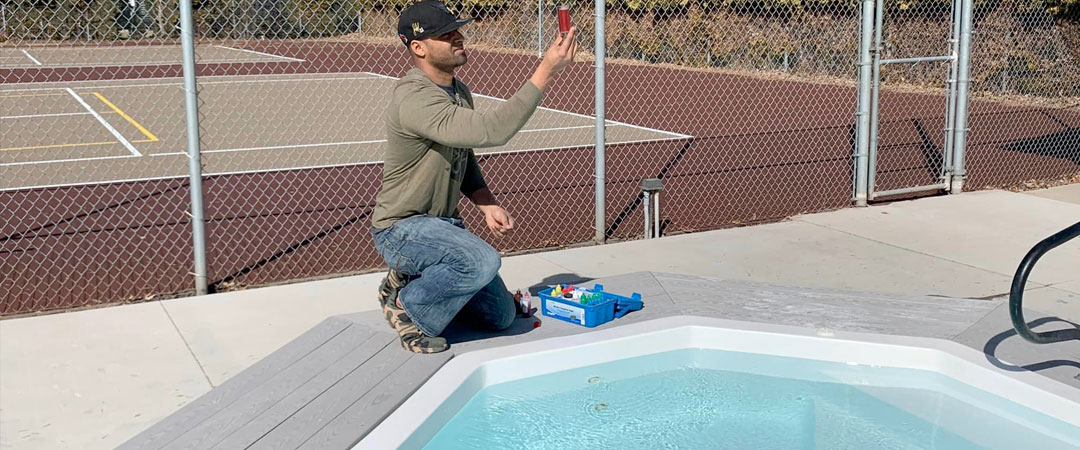Maintaining water quality is a critical aspect of owning a pool or hot tub. Regular water quality testing is essential for ensuring a safe, healthy, and enjoyable experience for all users. This process helps maintain the chemical balance of the water, prevents equipment damage, and protects the health of swimmers. Here’s a closer look at why water quality testing is so important:
1. Safety and Health
One of the most crucial reasons for regular water quality testing is to ensure the safety and health of swimmers. Pools and hot tubs can harbor harmful bacteria, viruses, and contaminants if not properly maintained. Regular testing helps identify these potential hazards, allowing for timely corrective actions. This is especially important in public or frequently used pools and hot tubs, where the risk of waterborne illnesses can be higher.
2. Maintaining Water Balance
Proper water balance is vital for preventing a range of issues. Testing the water’s pH, alkalinity, and calcium hardness levels ensures that these parameters are within the ideal range. A balanced water chemistry prevents problems like equipment corrosion, scaling, and skin or eye irritation. For instance, if the pH is too low, the water can become acidic, leading to corrosion of metal parts and discomfort for swimmers. Conversely, high pH can cause scaling and cloudy water.
3. Optimizing Chemical Efficiency
Regular water quality testing allows for precise chemical adjustments, ensuring that sanitizers like chlorine or bromine are effective. This optimization not only keeps the water safe and clean but also reduces unnecessary chemical use. Overusing chemicals can lead to high costs and potential skin irritation, while underuse can result in ineffective sanitization and unsafe water conditions. By testing regularly, you can maintain the right chemical balance, ensuring a pleasant and safe environment.
4. Protecting Equipment
Balanced water chemistry is not just about safety and comfort; it also protects the equipment and infrastructure of your pool or hot tub. Imbalanced water can cause significant damage to components such as pumps, filters, heaters, and plumbing. For example, acidic water can corrode metal parts, while high calcium hardness can lead to scale buildup in the system. Regular testing and adjustments help prevent these issues, potentially saving significant money on repairs and replacements.
5. Compliance with Health Standards
In many regions, health departments require routine water quality testing for public pools and hot tubs to meet safety standards. Compliance with these regulations is essential to avoid penalties and ensure the facility’s continued operation. Even for private pool and hot tub owners, adhering to these standards is a good practice to ensure a safe environment for all users.
6. Cost Savings
Proper maintenance through regular water quality testing can lead to substantial long-term savings. By preventing equipment damage, avoiding excessive chemical use, and maintaining a balanced water chemistry, you reduce the likelihood of costly repairs and replacements. Additionally, maintaining optimal water quality can extend the lifespan of your pool or hot tub components, providing better value over time.
Conclusion
Water quality testing is an essential part of maintaining a safe, healthy, and enjoyable pool or hot tub environment. Regular testing ensures proper chemical balance, protects swimmers’ health, prevents equipment damage, and helps meet compliance standards. Experts recommend testing pool water at least weekly, or more frequently with heavy use. For the most accurate results, consider professional testing services or digital testing methods. Consistent and accurate water quality testing is a small investment that pays off in safety, comfort, and cost savings.
FAQs
1. How often should I test the water in my pool or hot tub?
Answer: It is recommended to test the water at least once a week. However, if the pool or hot tub is heavily used, especially during the summer months, more frequent testing may be necessary to maintain proper water quality.
2. What parameters should I test for in my pool or hot tub water?
Answer: Key parameters to test include pH, alkalinity, calcium hardness, and sanitizer levels (such as chlorine or bromine). These factors are essential for maintaining balanced water chemistry and ensuring a safe environment.
3. Can I use test strips, or should I opt for a digital tester?
Answer: While test strips are a convenient and quick way to check water quality, digital testers offer more accurate and precise readings. For the best results, consider using a digital tester or having your water professionally tested periodically.
4. What are the risks of not regularly testing my pool or hot tub water?
Answer: Failing to test the water regularly can lead to imbalanced water chemistry, which can cause equipment damage, health risks from bacteria and contaminants, and discomfort from issues like skin or eye irritation.
5. Is it necessary to test for contaminants even if the water looks clear?
Answer: Yes, clear water does not always mean safe water. Harmful bacteria and contaminants can be present even if the water looks clean. Regular testing is essential to ensure the water is truly safe for use.

